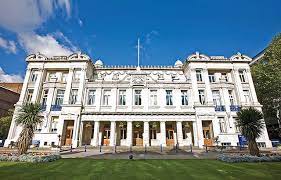Queen Mary University of London: Sustainability, curriculum transformation and student success – recapping the 2022 Drapers’ Lecture
This year’s talk was given by Professor Simon Kemp, the University of Southampton’s lead in Education for Sustainable Development. Professor Kemp discussed engaging students and staff in sustainability, specifically how the UN Sustainable Development Goals (SDGs) can lead to curriculum transformation, community partnership and student success.
Professor Kemp opened by outlining the clear global crisis we are facing using climate change as an interconnected example, providing a brief look into some of the data behind this well-established issue and looking at global temperature projections with the possible sustainability impacts up to 2100.
In covering the roadmap for a better future, discussion moved to the UN Sustainable Development Goals. These are 17 urgent calls for action by all countries, and include no poverty, gender equality, climate action, and decent work and economic growth. “These goals are a way of engaging students. They are ideas that we can all get behind,” Professor Kemp explained. However, when elaborating he stressed that it is wrong to burden students with solving all these issues single-handedly, and that we all need to play a part. He added that one of the best aspects of their design is their interconnection: “You cannot tackle climate change without addressing sustainable cities and communities, for instance.”
Fittingly, the lecture introduced the role that higher education plays in sustainability. Professor Kemp noted: “What comes out of education is world changing research. Where have all the experts we listen to today, the ones who lead research articles, come from? They all went to universities and studied for their qualifications.” Beyond this, he emphasised that the only way to solve challenges is through creative thinking. Universities provide the ideal environment for this to take place where academics from different disciplines can come together.
Segueing into curriculum transformation, Professor Kemp highlighted that he shares a commitment to one of the core principles of Queen Mary’s education approach: “Led by academics on their own, it is not fit for purpose. It is actually about student engagement, co-creation, and getting them right at the heart of it.” He highlighted his own role at the University of Southampton in bringing the UN SDGs into each module, providing a look across the sector in examples of best practice. Queen Mary featured as part of this, specifically a project to embed analysis of climate change into the mathematics curriculum.
The highly engaging session concluded with Professor Kemp posing the question of what student success looks like. While notions of how students engage with their peers, skills gained for the future, and interdisciplinary learning are important, for Professor Kemp it is a far more straightforward measure: “I think it is about students working together which allows us to tackle our carbon dioxide levels to meet future targets,” he said. “By using universities as safe educational spaces we can innovate and get to these kinds of situations.”
Professor Stephanie Marshall, Vice-Principal (Education) at Queen Mary University of London said: “We were delighted that Simon was able to deliver this year’s Drapers’ Lecture. It was a fascinating talk that gave everyone in the room lots to think about. I’d like to thank him for so passionately discussing an issue of burning importance both in the higher education sector and beyond.”
The lecture was preceded by a ceremony, led by Professor Marshall, recognising the achievements of Queen Mary educators over the past year across each of the three faculties.

